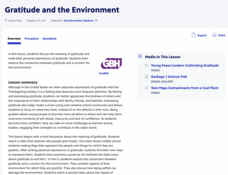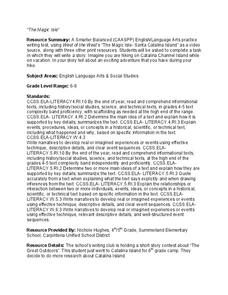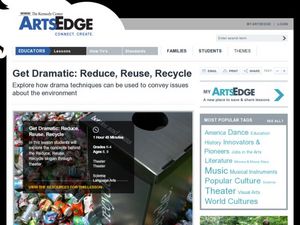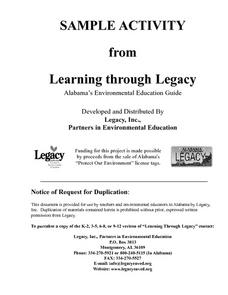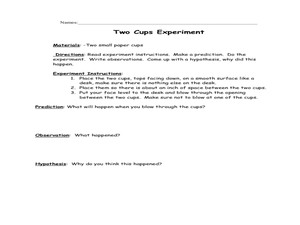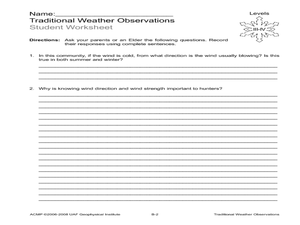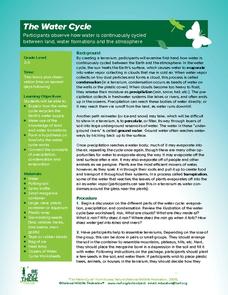K12 Reader
Limited Resources
Here's a comprehension exercise that asks readers to include direct quotes in their analysis of an article on ways to conserve natural resources.
PBS
Gratitude and the Environment
A class discussion begins a two-part lesson about gratitude and the environment. In part one, learners watch a video then share their feelings about its most memorable moment. Delving deep into the meaning of gratitude, scholars create...
National Science Teachers Association
The Ethanol Project
In a mock senate hearing regarding the development of ethanol as a fuel source, each person in the class is assigned a role to play and must uphold the stance of their character. Once the senate hearing is complete, each person writes a...
Project Noah
Writing Goes Wild
Young scientists develop their observation and writing skills as they craft and then post a detailed description of a plant or animal they have spotted and photographed.
Stanford University
Solstice and Equinox Season Model
How can December 21 be the shortest day of the year when all days are 24 hours long? Pupils see how to build a model showing the differences between winter and summer solstices and equinoxes. Using this model, classes can then discuss...
Channel Islands Film
Magic Isle: Lesson Plan 3
Middle schoolers complete a writing assessment task to demonstrate their ability to craft a narrative based on a variety of informational texts. They view West of the West's documentary Magic Isle, read three print resources about...
Curated OER
Aristotelian and Newtonian Motion
High schoolers use a quotation from Einstein as a reference to categorize their descriptions as either Newtonian or Aristotelian. They discuss the idealized nature of the Newtonian approach. Students describe the events they observe...
Curated OER
Get Dramatic: Reduce, Reuse, Recycle
Students explain reducing, recycling and reusing. In this science/ arts lesson, students create a commercial and display a backdrop made out of recycled goods. Additionally, students write written responses to writing prompts.
Curated OER
Posters and People
Young scholars create and design posters reflecting the types of litter harmful to aquatic wildlife. They explain the dangers of fishing line to aquatic wildlife, plastic bags to dolphins, and fish nets to fish. They design a poster to...
Curated OER
Understanding Bernoulli's Principle
Fifth graders explain why we fly. For this space science lesson, 5th graders discuss Bernoulli's prinicple and its relation to flight.
Curated OER
Traditional Weather Observations
Students explore traditional methods of weather observation. In this weather lesson, students interview grown-ups regarding wind. Students learn how winds can help forecast weather.
Curated OER
Real or hoax?
Seventh graders brainstorm a list of criteria that makes a webpage useful for research and not useful for research. They complete the activity, "Real or Hoax," and discuss fiction and non fiction stories and determine which websites are...
Curated OER
The Water Cycle
Students are introduced to the components and importance of the water cycle. They are shown how groundwater moves using a model. Students list 9 places on earth where water is found. They define the terms cycle and water cycle.
Curated OER
Conservation
Fifth graders examine how destructive fishing practices affect the health of coral reefs. They watch a Powerpoint Presentation, conduct an experiment, and in small groups create a Powerpoint Presentation.
Curated OER
Yearly Place Based theme
Students are awaken to their surroundings. They gain a greater access of how their city was formed. Students assess the human impact on the land. They comprehend the cultural diversity of the city.

